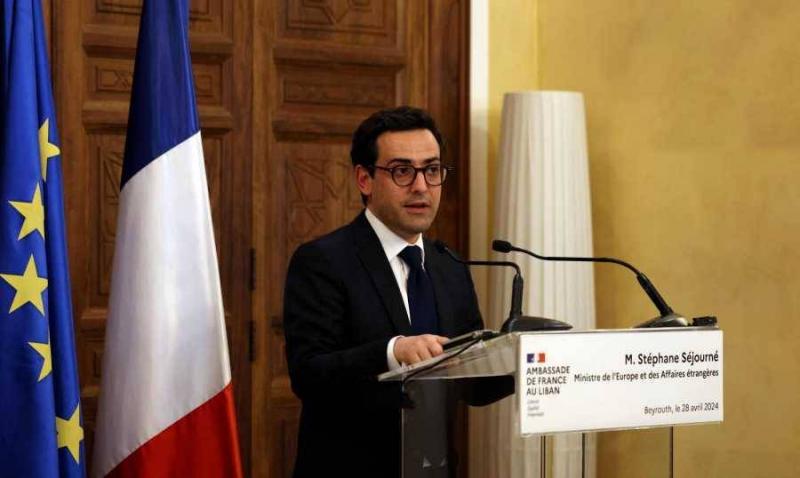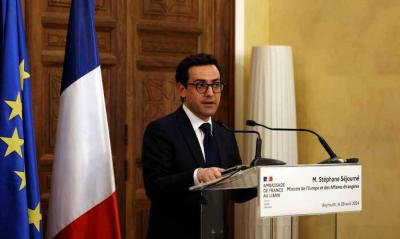Several developments have emerged regarding external efforts concerning the southern front with Israel, notably Lebanon's completion of its response to the French proposal paper discussed by French Foreign Minister Stéphane Sigourney with Lebanese officials during his visit at the end of last month. Al-Akhbar learned that the French authorities informed Prime Minister Najib Mikati that Paris had heard negative Lebanese remarks regarding the paper and that the Ministry of Foreign Affairs, in collaboration with the Ministry of Defense and Intelligence, is working on incorporating amendments. According to a prominent government source, France has prepared a new paper in recent days and has provided a copy to the Prime Minister.
Sources indicate that the new development is the sending of U.S. envoy Amos Hochstein to Paris to establish a coordination mechanism between the two countries to prevent any conflict in the ongoing efforts with Lebanon, particularly concerning Hezbollah. It was clarified that everyone acts as though the decision lies with the Americans, but Washington wants to involve France at some stage, as it needs France for additional files in Lebanon. Sources firmly stated that Hochstein reiterated that once Israel and Hamas publicly commit to a ceasefire agreement, and Hezbollah adheres to calm in the south, he will immediately travel to Beirut and Tel Aviv to finalize arrangements that ensure the sustainability of the ceasefire on the border between the two countries, hoping to reach a formula that prevents resumption of confrontations in the event of any negative developments in Gaza.
Paris had previously presented a paper that included a three-phase solution, starting with cessation of military operations, the return of Lebanese and Israeli displaced persons, and launching a negotiation track that replicates the April 1996 understanding to establish stability on both sides of the border permanently and completely. In this context, Al-Akhbar learned that Speaker of the House Nabih Berri provided French Ambassador to Lebanon Hervé Magro with a paper of observations on the French proposal that included around 12 comments, primarily based on the premise that the discussion revolves around the implementation of Resolution 1701 and not around a new resolution, thus there can be no agreement to replace this resolution. Additionally, there were objections to what was termed a repositioning of Hezbollah forces in the south.
Lebanese remarks emphasized that it is not possible to introduce amendments or impose modifications forcefully on the text of Resolution 1701, and that Lebanon would not accept granting the international forces the freedom to carry out movements without prior oversight or the involvement of the army in any area in the south. It also categorically rejected discussions about armed groups and the withdrawal of the Radwan forces or others from the south, stressing that it only seeks the full implementation of Resolution 1701 and guarantees Israel's commitment to its entirety regarding withdrawal from all occupied territories and avoiding any form of violations. The remarks highlighted that the international resolution originally proposes the deployment of the Lebanese army in the south; however, the Lebanese government is responsible for the army and for the plan to redeploy it in the south and the nature of the tasks assigned to it.
Informed sources indicated that Hezbollah refused to discuss the French paper or any others in front of foreign diplomats and informed Lebanese authorities that it is not interested in any discussion of any idea from any party until the aggression against Gaza stops. After that, the party is willing to discuss any matter within the framework of reinforcing Lebanese sovereignty, not in the context of enhancing the enemy's security at Lebanon's expense. The sources explained that Hezbollah leaders drew the attention of Lebanese officials and some foreigners to the fact that the situation cannot be managed under the belief that Lebanon is facing a crisis; rather, it is the enemy that is in a predicament. The solution lies in providing practical guarantees to Lebanon regarding the removal of all types of existing ground violations and a clear commitment to stop all forms of aerial and maritime violations.
According to a Lebanese official, the ongoing discussions resulted in an agreement to inform all mediators that as long as the enemy continues to violate Lebanese sovereignty on land, air, or sea, no steps should be expected from Lebanon. The official indicated that the problem with discussions with international parties arises from these capitals attempting to provide guarantees to appease the enemy, noting that political realism requires Lebanese officials to engage with the party capable of exerting pressure on Israel to extract concessions from it, which directs the approach toward Washington. Thus, time should not be wasted with the French side or any European party that appears to be working solely to satisfy Israel at Lebanon's expense.




